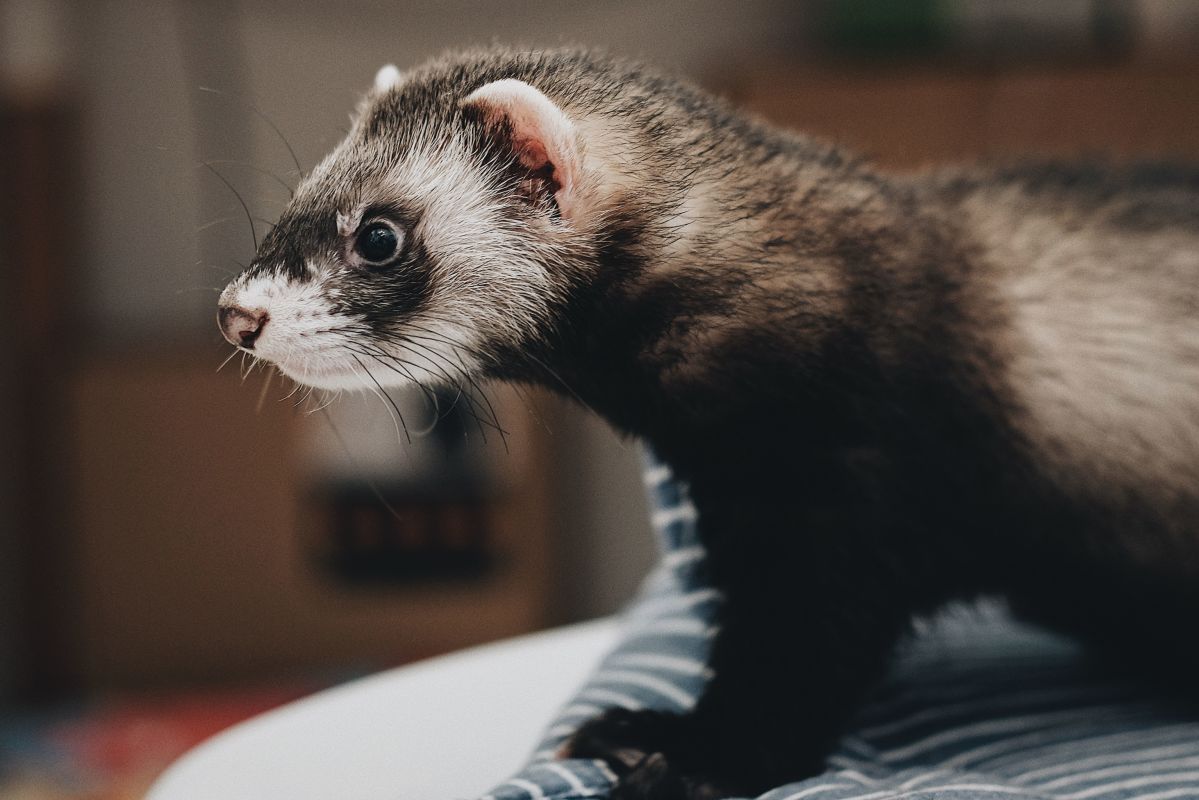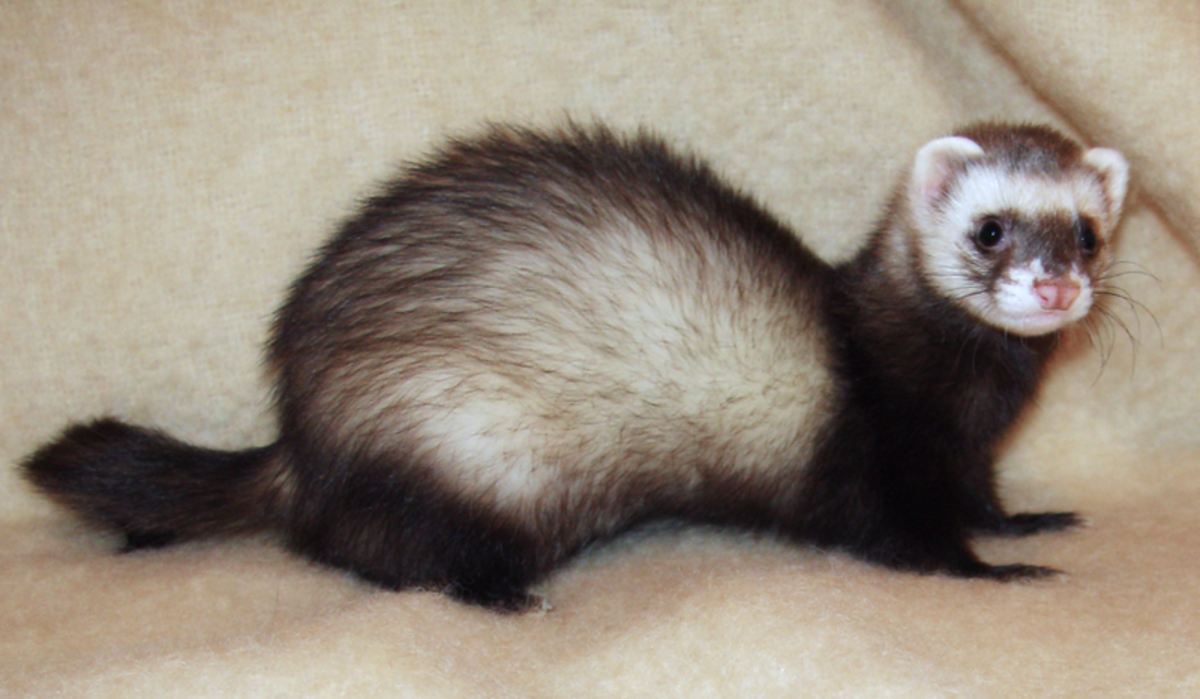
Photo by Steve Tsang on Unsplash
Ferrets 101
Domestic ferrets are descended from the European polecat and were historically used for hunting mice and rabbits. With a lifespan of five to eight years and many color variations, their unique physical characteristics and charming personalities have made them popular pets in the United States.
If you are a new ferret owner or considering getting one as a pet, here are some basics on caring for these creatures.
In this article
- Behavior
- What do they eat?
- Housing Needs
- Preventive Care
- Common Medical Conditions Requiring Veterinary Attention
Behavior
Ferrets are very active and curious animals that enjoy the company of people, other animals, and other ferrets. These creatures are particularly intelligent and train quickly, and can even be litter-box trained like cats and taught to make a particular sound.
Ferrets are quiet animals, preferring to hide and linger in quiet areas of the household. They are notorious for getting into tight spaces, making them escape artists; they can disappear and remain invisible in a household for hours at a time.
What do they eat?
Contrary to popular belief, ferrets are true carnivores and do not handle high-fiber diets well. Ferrets use fat for energy, so a highly digestible, meat-based, high-protein diet is essential. Ferrets prefer to eat several smaller meals throughout the day and also like to stash their food for later. Avoid adding any salt to their food, and make sure fresh water is always available. Dairy products, raisins, fruits, and vegetables should also be avoided.
Similar to cats, commercial ferret diets should contain taurine and consist of 15-20% animal fat and at least 32-40% animal-based protein. Carbohydrates should not be fed as a ferret’s main source of energy, and commercial diets that are very low in carbohydrates, fiber, and grains are the best choice. Although cat diets can be thought of as very similar, dry foods designed for cats should not be fed to ferrets.
Brands I Recommend From Personal Experience
- Wysong: Ferret Archetypal- 1 (grain-free, high-protein animal-based)
- Wysong: Ferret Archetypal- 2 (grain restricted)
- Innova Evo: Dry Ferret Food (grain-free, lower carbohydrates)
- Natural Variety: Chicken, Turkey, Rabbit (grain free)
- Zupreem Premium Ferret Diet: Dry Food (grain restricted)
- Eagle Pack Holistic Select Ferret: Dry Food (grain restricted)

By Alfredo Gutierrez[GFDL (http://www.gnu.org/copyleft/fdl.html) or CC BY-SA 4.0 (https://creativecommons.org/licenses/by-SA/4.0)]from Wikimedia Commons
Housing Needs
The size of the cage for the growing ferret should be at least 24″ x 24″ x 18″ minimum, but it should not be used all day. The floor should be blanket instead of mesh and should be multilevel, which avoiding steep ramps. Ferrets should have access to light for 12 to 16 hours a day, and the temperature should be maintained between 59–77ºF. Ferrets prefer to sleep curled up in towels, blankets, or sweaters inside boxes or cradles.
Ferrets are easy to train to use litter boxes, as they like to eliminate mainly in corners and on vertical surfaces. Pellet or shredded paper-based litter is best, but avoid cat litter as it can irritate the ferret’s skin and paws.
Toy Options
- Paper bags
- PVC piping
- Ping-pong balls
- Golf balls
- Small cloth baby toy
- Specially designed ferret toys
Almost anything can be used; however, do not give your ferret any rubber or latex toys. Very little grooming is required, as ferrets usually groom themselves.
Time outside the cage on a daily basis is essential for proper physical and mental activity of ferrets. Ferrets are expert escape artists, and great care must be taken to safely hide or “ferret proof” (if possible) a play area.
Specially designed exercise pens for ferrets are a great option for a safe play area. Care should be taken in multi-species households to avoid conflicts, especially regarding prey animals.
Preventive Care
Bi-annual physical examinations of the heart, lungs, body temperature, weight, and other general condition are highly recommended by veterinarians. As with dogs, a distemper booster and rabies vaccine should be given annually. Also, as with dogs, heartworm and flea preventatives are highly recommended, even if the ferret never appears.

By Craig M. Groshek (talk · contrib)[Public domain]via Wikimedia Commons
Common Medical Conditions Requiring Veterinary Attention
Medical conditions commonly observed in ferrets include:
- Human Influenza Viruses: Ferrets are susceptible to the human influenza virus and can get the flu from humans just as humans can get the flu from ferrets (known as zoonosis). Care should be taken to avoid cross-contamination when the person or the ferret has the flu.
- Heartworms/fleas: Ferrets, like cats and dogs, can be infected with heartworms and fleas. Ferrets should be kept on heartworm/flea preventive as directed by your veterinarian.
- Foreign Bodies in the Stomach or Intestines: Ferrets, especially those under one year old, will eat things they shouldn’t; these things can easily enter the intestine or stomach. Adult ferrets can develop large masses of hair on the abdomen, which can cause an obstruction. All of these situations are life-threatening and usually require surgery to remove the foreign body. Signs of a foreign body include dizziness, dehydration, vomiting, constipation, a painful stomach, and eventually death.
- Epizootic Catarrhal Enteritis (ECE): Also commonly known as “green slim disease.” Signs of ECE range from vomiting and a soft, green, mucous-coated stool to bloody diarrhea. An existing ferret in the home is susceptible to disease from the introduction of new ferrets. It is highly recommended that any new ferrets be quarantined for at least three weeks prior to introduction (and, if possible, in a separate house).
- Rabies: Rabies vaccination of ferrets is required by New York State Law and is becoming mandatory in other states as well. Check your state’s laws regarding rabies vaccination of pets. Rabies is a deadly zoonotic disease in both animals and humans and preventing the spread of this disease is critical for the protection of all.
- Distemper: Distemper is an infectious disease caused by the canine distemper virus. The virus can be passed directly to ferrets from infected animals such as dogs, foxes, raccoons, and other ferrets. Contact with infected material, such as shoes or clothing, can also spread the disease. Annual vaccinations are recommended to reduce your ferret’s risk of contracting the virus.
Sources
- Exotic animal care course notes from Lincoln Memorial University Veterinary Medical Technology courses.
- Avian and exotics externship rotation at the University of Tennessee College of Veterinary Medicine teaching hospital.
- Personal experience as a licensed veterinary technologist.
This article is accurate and true to the best of the author’s knowledge. It is not intended to replace diagnosis, prognosis, treatment, prescription, or formal and individualized advice from a veterinary medical professional. Animals showing signs and symptoms of distress should be seen by a veterinarian immediately.
© 2018 Liz Hardin


